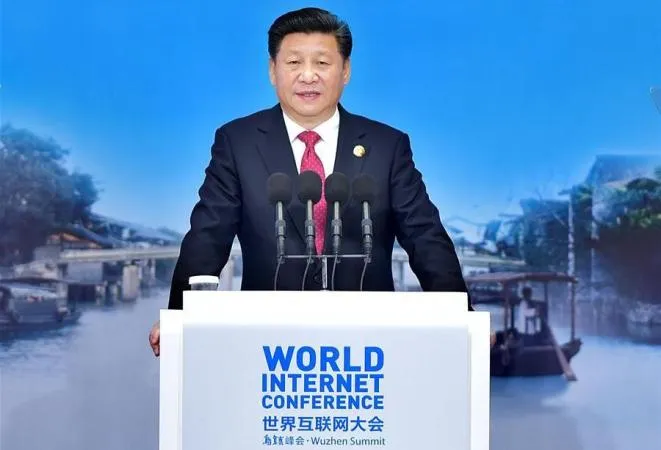-
CENTRES
Progammes & Centres
Location

From December 16 to 18, 2015, the Second World Internet Conference (WIC) was held in the town of Wuzhen in East China’s Zhejiang Province. This year’s conference was based on the theme “An Interconnected World Shared and Governed by all – Building a Community of Common Future in Cyberspace,” and got together more than 2000 representatives from over 120 countries and regions and over 20 international organisations. President Xi Jinping, for the first time, delivered a keynote speech at the opening ceremony, and proposed four principles and five initiatives to make the Internet safer, interconnected and constructive.
The WIC scored two major achievements this year. The first one is the establishment of a high-level advisory committee for the WIC organising committee secretariat, which invited 31 world leading Internet figures from governments, enterprises, academic institutions and technological communities to offer advice for the WIC and to contribute ideas for the development of Internet in China. With the advisory committee, the Chinese organising group tried to make the conference reflect aspirations and concerns of all countries in a more balanced way and to promote international cooperation and exchanges on Internet-related issues.
The second achievement is the exposition of China’s views on Internet governance. It could be summarised through four key goals: (1) a cyberspace community of shared destiny, highlighting the necessity to eliminate the digital divide between countries so as to enjoy the common benefits of the sharing economy; (2) Internet sovereignty, holding that the rights of individual countries to choose their own Internet development path and policies be respected; and that global Internet governance be carried on an equal basis, without interfering in other countries' internal affairs or engaging in or support cyberspace activities that jeopardise the national security of others; (3) Cyber security, calling for all countries in the world to work together in preventing the use of cyberspace for criminal activities, and no countries could seek absolute security of itself at the expense of others; (4) Internet governance, emphasising that Internet governance models should not only incorporate certain common principles but also respect the uniqueness of each country.
Of all the above, the outside world is still concerned with the debate over two seemingly competing governance models: the bottom up, consensus-driven multi-stakeholder model, like ICANN, with governments relegated to an advisory role; the other is the so-called top-down multilateral model that China and Russia supported, with governments in charge.
In his speech, Xi Jinping reiterated China’s views as follows: “international Internet governance should be carried out with “duobian (multilateral)” participation, and all players including the government, international organisations, Internet companies, technical communities, civil societies and citizens shall play a role in it; the decision should not be made in a unilateral way or by only a few actors.”
In Chinese, “duobian (multilateral)” means participation with various actors, which could be either states or other actors. Based on Xi’s speech, China’s position on international Internet governance could be interpreted in the following way: first, the various actors have different roles to play in the process due to their different positions, the roles of different actors are always complementary, and no one could be replaced by others; Second, the framework of Internet governance relates to a variety of issues in its technical, logical and content layers, and it would be improbable to expect governments to attend to all concerns, let alone dominate them.
Multistakeholderism basically means the various actors are on an equal footing; neither states nor non-state actors have a dominating role, and it doesn’t and should not bring the ICANN model to the whole international Internet governance model. In practice, most international institutions always have an actor to take the lead.
Even proponents of multistakeholderism agree that states could intervene in Internet governance so as to address “high-level threats to peace and security”. However, different states always have different logics and ways to define those “high-level threats” given their own national conditions. In my opinion, the so-called multilateral and multistakeholder models both recognise the participation of various actors, but only at two different ends of one spectrum. As it stands, it’s more reasonable to target specific issues instead of trying to secure consensus on applying a single model to all issues.
Cyberspace is a new field of global governance, and currently there’s no existing international regime or norms to follow. All countries and players could voice out their views and hold discussions on international platforms. 2015 is the second year of the Wuzhen Summit, and now it has attracted attention from all over the world. The summit has made some progress, but it also has quite a lot to improve, for example, how to make the conference procedures accommodate more diversified views of different countries and actors, and how to make it more attractive to other actors in the world through some practical initiatives.
Being an emerging power, China has become more proactive in participating in global governance. In the era of Internet economy, international Internet governance has become a prominent and urgent issue for states and other actors in the world. Wuzhen summit is not only one such important platform for Internet governance but also a big window for China’s diplomacy. Thus, China should not only make Wuzhen Summit a stage to speak for the developing countries but also promote it to a real world Internet conference.
Lang Ping is a Senior Research Fellow, Institute of World Economics and Politics at the Chinese Academy of Social Sciences
The views expressed above belong to the author(s). ORF research and analyses now available on Telegram! Click here to access our curated content — blogs, longforms and interviews.